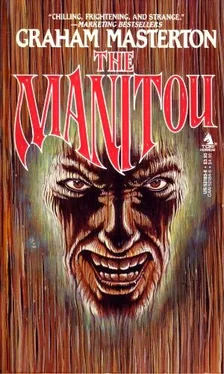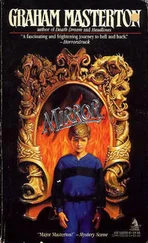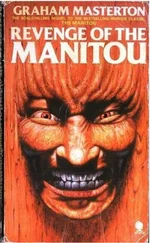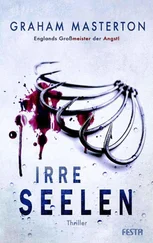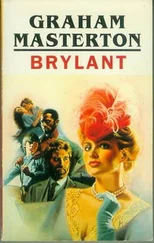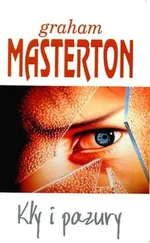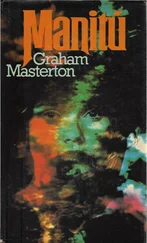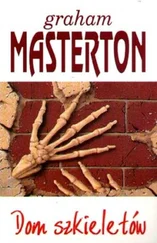I found Dr. Hughes in his office, reading a pile of reports by the light of his desk lamp.
"Mr. Erskine," he said, "you're back. How did it go?"
I flopped down in the chair opposite him. "I think we know what's going on, anyway. But whether we'll be able to fight it or not — well, that's another question."
He listened seriously while I explained what Dr. Snow had said. I also told him that we were trying to find a rival medicine man to fly into New York.
Dr. Hughes got up from his chair and went over to the window. He stared down at the crawling lights of traffic, and the first spinning flakes of a fresh snowfall.
"I just hope to God that none of this leaks out to the newspapers," he said. "It's difficult enough keeping it quiet from the rest of the specialists and surgeons involved. But just think about it — the world's second or third leading specialist on tumors has to bring in a redskin from the plains of South Dakota, some mumbo-jumbo artist with warpaint and bones, because he can't manage to deal with a tumor by himself."
"You knows well as I do that this isn't any ordinary tumor," I said. "And you can't fight a magic tumor with ordinary methods. The proof of what you're doing will be in the cure."
Dr. Hughes looked away from the window. "And supposing she doesn't get cured? What do I say then? I brought in a redskin medicine man, but that wasn't any use, either?"
"Dr. Hughes —"
"It's okay, Mr. Erskine. I don't really have any qualms about this. I've seen enough tumors in my life to know that this isn't anything like an ordinary condition. And I believe your theory, about the Indians. I don't know why I believe it, but I can't see any other rational explanation. None of my colleagues has even got as much as a wild guess."
"How is she, doctor?" I asked him. "Is the tumor still growing?"
"Do you want to see for yourself?" he said. "It's got worse since you last saw her, yesterday."
"If it's okay. I'll try not to upset her, like last time."
In silence, we took the elevator to the tenth floor. In silence, we put on masks and robes. In silence, we walked down the corridor to Karen Tandy's room, and opened the door.
It was grotesque. Karen Tandy was lying on her front now, her face as white as the sheet it was resting on. The tumor lay bloatedly on her back, a fat white bladder of swollen skin. It was as big as a pillow, and it seemed to shift and bulge and ease itself from time to time, a great pulpy growth with a malignant life of its own.
"God," I said softly. "It's grown enormous."
"And it's getting bigger all the time," said Dr. Hughes. "Come here, feel it."
I stepped cautiously up to the bedside. The tumor was so big that it was hard to believe it was actually part of the girl who lay under it, carrying it on her back like a sickening hump. I gingerly reached out with my fingertips and pressed it. It seemed firm and distended, but there was a sensation of something slithery inside. In fact, it felt exactly like the stomach of a pregnant woman.
"Can't you just kill it?" I asked Dr. Hughes. "It must be the size of a small child by now. Can't you just stick a scalpel into it?"
Dr. Hughes shook his head. "I wish I could. I'd like to chop it off with a meat cleaver, if you want to know the truth. But every X-ray shows that the nervous system of this creature is inextricably bound up with Karen's nervous system. Any surgical attempt to remove it would kill her at once. They're not so much like mother and child — they're more like Siamese twins."
"Can she talk at all?"
"She hasn't said anything for several hours. We took her out of bed to weigh her this morning, and she spoke a couple of words then, but nothing that any of us could understand."
"You weighed her? Is she in a bad way?"
Dr. Hughes tucked his hands in the pockets of his robe and looked sadly down at his dying patient. "She hasn't lost any weight at all — but she hasn't gained any either. Whatever this tumor is, it's taking all its sustenance directly from her. Every ounce it grows, it takes from Karen."
"Have her parents been in touch?"
"They came in this morning. The mother was very upset. I told them that we were going to try for an operation, but naturally I didn't say anything about the medicine man stuff. They were angry enough at me as it was, because I hadn't been able to operate already. If I'd started telling them about oldtime red Indians, they would have thought I was off my head."
I took one last look at Karen Tandy, lying white and silent under her sickening burden, and then we left the room and went back to Dr. Hughes' office on the eighteenth floor.
"Do you think her parents will be hard to convince? I asked him. "The problem is that all this is going to take money. We're going to have to bribe the medicine man, and we're going to have to pay for his plane fare and his hotel, not to mention what the hell might happen if he gets hurt in the battle. I'd love to help, but us clairvoyants are not exactly Rockefellers. I doubt if I could raise more than three or four hundred bucks."
Dr. Hughes looked glum. "I could get the money out of the hospital under normal circumstances, but I don't see how I possibly can for the use of a medicine man. No, I think her parents have a right to know what's going on, anyway, and make the choice for themselves. After all, the life of their daughter is at stake."
"Do you want me to talk to them?" I asked him.
"You could, if you want to. They're staying at Karen's aunt's place, on Eighty-second. If you get into any trouble, ask them to call me and confirm that you have my support."
"Okay," I said. "Now, how about a drink?"
"Good thinking," said Dr. Hughes, and fetched out his bottle of bourbon. He poured out a couple of large ones, and I swallowed mine just as it came, fiery and revitalizing after a weary day's drive to Albany and back. I sat back and Dr. Hughes offered me a cigarette.
We smoked for a while in silence, then I said: "Dr. Hughes —"
"Why don't you call me Jack? This hospital's pretty formal. It gives the patients confidence if they hear people being called 'doctor' all the time. But I don't think that's the kind of confidence you need."
"Okay, Jack. I'm Harry."
"That's better. Nice to know you, Harry."
I swallowed some more bourbon. "Jack," I said, "have you stopped to consider exactly what we're doing here and why we're doing it? I don't know Karen Tandy much better than I know you. I just sometimes think, what the hell am I doing driving to Albany and back for someone I don't even know."
Jack Hughes grinned. "Don't you think that isn't a question that everybody who helps other people ask themselves? I ask myself that question ten times a day. When you're a doctor of medicine, you're taken for granted. People come to you when they're sick, and think you're terrific, but as soon as they're well again, you cease to be interesting. Some patients are grateful. I get Christmas cards every year from some of them. But most of them wouldn't even recognize me if I bumped into them on the street."
"I guess you're right," I said.
"I know I'm right," replied Jack. "But I think this case is something different. I'm not interested in this case for the usual reasons. The way I see it, this thing that's growing in Karen Tandy represents a whole medical and cultural problem."
"What do you mean?"
Jack Hughes stood up and came over to sit on the edge of his desk right next to me.
"Look at it this way," he said. "The fascinating thing about America is that it was always supposed to be a brand new nation, free of oppression and free of guilt. But from the moment the white man settled here, there was a built-in time bomb of guilt. In the Declaration of Independence, there is even an attempt to gloss over this guilt, you remember? Jefferson wrote about the 'merciless Indian Savages, whose known rule of warfare is an undistinguished destruction of all ages, sexes and conditions.' Right from the beginning, the Indian has not counted as an individual who is endowed by his Creator with those certain inalienable rights.
Читать дальше
